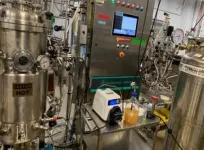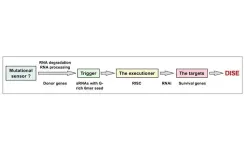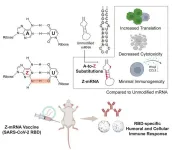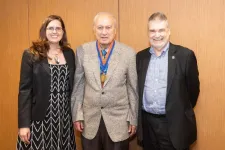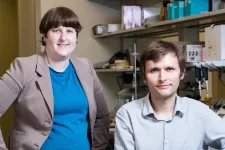(Press-News.org) As a source of protein and biodiesel for cleaner renewable energy, soybean is an important crop worldwide. But is it performing to its full potential? An ambitious effort led by the University of Illinois Urbana-Champaign and the U.S. Department of Energy Joint Genome Institute (JGI) will sequence 400 soybean genomes to develop a “pangenome” — an attempt to characterize all the useful diversity in the genome to create an even more robust and resilient crop.
The soybean pangenome project will sequence and analyze at least 50 soybean genomes from cultivated lines and wild relatives at reference quality, the gold standard of modern sequencing. A further 350 genomes will be sequenced as high-quality drafts by the JGI. The plan is to include a diverse set of soybean lines, including perennial relatives and lines selected to yield in harsh conditions, preparing the industry to move toward a climate-resilient future.
“There have been soybean pangenome efforts before, but this will be a big step forward. We want to identify all of the variation present within this diverse set of cultivated soybeans. Knowing details of all of the genetic variation should very much enhance and speed up the ability of crop breeders and biotechnology experts to identify important genes and incorporate them into better crops,” said project leader Matt Hudson, professor in the Department of Crop Sciences, part of the College of Agricultural, Consumer and Environmental Sciences (ACES) at U. of I. He is also co-director of the Center for Digital Agriculture, science integration chair for the Center for Advanced Bioenergy and Bioproducts Innovation (CABBI), and faculty affiliate at the Carl R. Woese Institute for Genomic Biology.
Hudson and his multi-institution collaborators will select and grow soybean lines, shipping extracted DNA to the JGI for long-read sequencing as part of the JGI’s Community Science Program. Hudson’s team, along with partners at U. of I.’s AIFARMS, will take the lead in analyzing the output.
“AIFARMS was designed to deal with large datasets coming out of agriculture projects,” Hudson said. “Having this dataset is going to be a boost for our other digital ag activities.”
With its inclusion of wild relatives and the sheer number of reference and high-quality draft genomes set for sequencing, the project will drastically improve the current soybean reference genome. Hudson explains that genetic diversity is the raw material for crop improvement, but the crop’s diversity is not reflected in the reference genome. He likens it to the first human genome, which was pieced together only from Caucasian individuals.
“There’s an increasing effort to have the reference human genome reflect all of the variation in people. We think there are equally big reasons to do the same thing in crops,” Hudson said. “But it’s hard to locate the missing diversity by any other means than sequencing more genomes.”
The team plans to consult the global soybean breeding community, including industry partners, in deciding priority lines to include.
Ultimately, Hudson said, the project will “enable deep analysis of the evolution and domestication of modern soybean and empower soybean researchers and breeders to directly select for otherwise hidden genetic variation in genes that can be targeted for variety development. As soybean is becoming increasingly important as a worldwide crop, as well as being a key bioenergy crop, this project will have global impact and be particularly relevant to U.S. agriculture."
about JGI's 2024 awardees.
END
Illinois-led project to sequence 400 soybean genomes, improve future crops
2023-10-03
ELSE PRESS RELEASES FROM THIS DATE:
An ancient anti-cancer mechanism: DISE
2023-10-03
“DISE is effective against all cancers we tested.”
A new editorial paper was published in Oncotarget's Volume 14 on September 25, 2023, entitled, “DISE, an ancient anti-cancer mechanism that senses mutational load in cancerous cells?”
In their new editorial, researchers Monal Patel and Marcus E. Peter from Northwestern University discuss a recent breakthrough in cancer therapy. Despite the multiple advances in therapy, cancer remains one of the most common causes of death globally. ...
Project aims to develop all-in-one semiconductor that stores, processes data
2023-10-03
A multi-institutional project led by a Penn State researcher is focused on developing an all-in-one semiconductor device that can both store data and perform computations. The project recently received $2 million in funding over three years as part of the new National Science Foundation Future of Semiconductors (FuSe) program, a $45.6 million investment to advance semiconductor technologies and manufacturing through 24 research and education projects across the United States.
“The goal of ...
Nemours Children’s Health hosts first-ever pediatric session at HLTH
2023-10-03
Nemours Children’s Health will host the first-ever dedicated pediatric session at HLTH, the leading platform bringing together the entire health ecosystem focused on health innovation and transformation. This invited program, “Elevating Kids Health Well Beyond Medicine,” will extend HLTH’s 2023 theme, “Elevating Humanity,” to focus on health in childhood and why it is the only way to build good health across the lifespan.
“The child health perspective is an essential viewpoint for the attendees of HLTH to consider and we are proud to offer ...
OU Engineering among top 28 teams nationwide selected for DEPSCoR Grant
2023-10-03
University of Oklahoma engineering researcher Reza Foudazi, Ph.D., has been selected to receive a $600,000 grant from the U.S. Department of Defense under the Defense Established Program to Stimulate Competitive Research, or DEPSCoR. The highly competitive grant was awarded to only 28 academic teams nationwide.
An associate professor in the School of Sustainable Chemical, Biological and Materials Engineering, Foudazi’s research centers on the exploration of electrochemical energy storage systems that incorporate multivalent ions. ...
From A to Z: An alternative base modification for mRNA therapeutics
2023-10-03
Messenger RNA (mRNA) technology has become popular in the last few years due to its use in COVID-19 vaccines. This technology has been so groundbreaking that it recently won the 2023 Nobel Prize in medicine “for discoveries concerning nucleoside base modifications that enabled the development of effective mRNA vaccines against COVID-19.” This isn’t new technology, however— modified mRNAs have been studied for decades and show significant potential for therapeutic applications. Compared to unmodified mRNAs, modified ...
Legendary UTA professor establishes endowed professorship in heat transfer
2023-10-03
Abdolhossein Haji-Sheikh, a retired professor in the Mechanical and Aerospace Engineering Department at The University of Texas at Arlington, has made a $500,000 gift to support his former department.
The gift creates an endowed professorship in heat transfer, one of Haji-Sheikh’s areas of expertise during his decades of teaching at UTA. The professorship will be awarded in 2026.
Haji-Sheikh began his career at what was then Arlington State College in 1966. He said he wants to give back to ...
Instant evolution: AI designs new robot from scratch in seconds
2023-10-03
Inventor of xenobots unveils new advance toward artificial life
New AI algorithm compresses billions of years of evolution into seconds
The evolved robot has three legs and rear fins, something a human engineer would never devise
Researcher: ‘Now anyone can watch evolution in action as AI generates better and better robot bodies in real time.’
A team led by Northwestern University researchers has developed the first artificial intelligence (AI) to date that can intelligently design robots from ...
Two Rice bioengineers win NIH Director’s New Innovator awards
2023-10-03
Two Rice University bioengineers received the National Institutes of Health (NIH) Director’s New Innovator Award (NIA) for creative research projects demonstrating broad impact potential.
Part of the High-Risk, High-Reward Research program, NIA awards support early-career investigators with ambitious, unconventional project proposals “in any area of biomedical, behavioral or social science research relevant to the NIH mission,” according to the agency’s website.
Rice’s ...
A promising treatment on the horizon for cancer-related fatigue
2023-10-03
Cancer-related fatigue (CRF) is a debilitating yet all-too-common condition, which can severely affect quality of life for patients undergoing treatment. For those struggling with CRF, there have been no effective pharmaceutical treatments for the constellation of symptoms that together define the syndrome.
In a new study led by Yale Cancer Center researchers at Yale School of Medicine, the team found that a metabolism-targeting drug called dichloroacetate (DCA) helped alleviate CRF in mice, without interfering with cancer ...
NRG Oncology-RTOG 1308 accrual completion: First phase III NCTN clinical trial comparing photon versus proton therapy to meet accrual target
2023-10-03
Effective September 26, 2023, NRG Oncology-RTOG 1308, a phase III randomized trial comparing overall survival after photon versus proton chemoradiotherapy for patients with inoperable stage II-IIIB non-small cell lung cancer (NSCLC) has met its accrual target. The trial, one of several NRG Oncology ongoing clinical trials across various malignancies within the National Clinical Trials Network (NCTN) that compare photon versus proton radiation therapy techniques, is the first phase III head-to-head comparison of these ...


